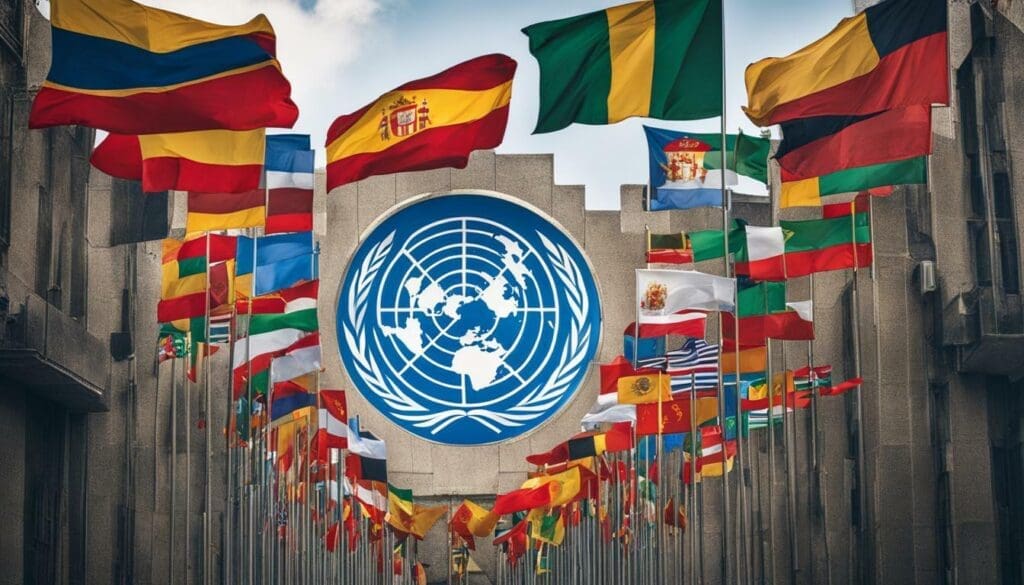Spanish holds a pivotal position within the United Nations (UN) as one of its official languages, playing a crucial role in facilitating communication and understanding among member states. With its widespread usage, the role of Spanish in the UN goes beyond mere interpretation and translation, extending to the provision of language services and support that ensure effective multilingual communication.
Key Takeaways:
- Spanish is one of the six official languages of the United Nations, alongside Arabic, Chinese, French, English, and Russian.
- In the UN, Spanish is used in all formal meetings, speeches, and is the language for many official documents.
- Despite its institutional representation being inferior to English and French, Spanish is recognized as the official language in 23 out of 30 UN organizations.
- Spanish is a working language in 15 UN organizations, demonstrating its significance and practicality.
- The UN emphasizes multilingualism and values the equal importance of all official languages, including Spanish.
- While Spanish has a strong presence in formal settings, its use in informal communication within the UN remains ahead of other non-official languages.
- The demand for Spanish language services in the United Nations continues to grow, reflecting its importance both within and outside the organization.
Spanish’s role in the United Nations goes beyond linguistic communication – it symbolizes the values of multilingualism, diversity, and inclusivity that the UN stands for. As the demand for Spanish language services continues to rise, the language will continue to shape global diplomacy and promote effective communication among member states.
The Importance of Spanish Interpretation and Translation in the UN
Spanish interpretation services and translation of official documents are essential in enabling meaningful participation and comprehension in formal UN meetings and conferences. As one of the six official languages of the United Nations, Spanish plays a vital role in facilitating multilateral communication and promoting inclusivity within the international organization.
With a diverse range of member states, each representing their unique linguistic and cultural backgrounds, the UN relies on interpretation services to break down language barriers and ensure effective communication. Spanish interpreters are instrumental in bridging the gap between Spanish-speaking delegates and those who communicate primarily in other languages, fostering dialogue and enhancing understanding.
In addition to interpretation, the translation of official documents into Spanish is crucial for accessibility and transparency. By providing Spanish-language versions of important documents, the UN ensures that Spanish-speaking delegates can fully engage in discussions, contribute to decision-making processes, and stay informed about important matters.
Furthermore, the availability of Spanish interpretation and translation services in the UN reflects the organization’s commitment to multilingualism and equal language rights. By recognizing and supporting the use of Spanish, the UN acknowledges the significance of linguistic diversity and strives to create an inclusive environment where all member states can fully participate.
| Key Points |
|---|
| Spanish interpretation and translation enable meaningful participation in UN meetings |
| Spanish interpreters bridge language barriers and promote inclusivity |
| Translation of official documents into Spanish ensures accessibility and transparency |
| UN’s commitment to multilingualism and equal language rights |
Spanish Language Services and Support in the United Nations
The United Nations provides various Spanish language services and support to ensure effective communication and assistance for Spanish-speaking delegates and representatives. As one of the six official languages of the United Nations, Spanish holds a prominent position in the organization’s operations, allowing for inclusivity and accessibility in diplomatic discussions and global affairs.
Language Services
Within the United Nations, Spanish language services encompass interpretation, translation, and document preparation. The organization employs a team of dedicated interpreters who provide simultaneous interpretation services during official meetings, ensuring that participants can communicate and understand each other in real-time. This allows Spanish-speaking delegates to actively participate in discussions and negotiations, contributing their perspectives and ideas to the decision-making process.
Translation services are also vital in the United Nations, as they ensure that official documents and publications are available in Spanish. This enables Spanish-speaking individuals to access important information and contribute to the work of the organization. Additionally, the United Nations provides support for the preparation of documents in Spanish, allowing for accurate and clear communication in the language.
Tailored to your learning curve, our Spanish programs in Malaga are your gateway to becoming a global citizen.
Language Support
In addition to language services, the United Nations offers language support to Spanish-speaking delegates and representatives. Spanish-speaking staff members are present throughout the organization, providing assistance and guidance to those who require it. This ensures that Spanish-speaking individuals have access to the necessary resources and information to effectively carry out their duties within the United Nations.
| Official Language | Number of UN Organizations Recognizing as Official Language | Number of UN Organizations Recognizing as Working Language |
|---|---|---|
| Spanish | 23 | 15 |
| English | 30 | 30 |
| French | 30 | 30 |
| Arabic | 29 | 20 |
| Chinese | 29 | 20 |
| Russian | 29 | 20 |
This commitment to language services and support promotes multilingualism and underscores the United Nations’ belief in the equal importance of all official languages. The Coordinator for Multilingualism plays a crucial role in implementing and ensuring the effective use of all official languages, including Spanish, throughout the UN Secretariat.
While Spanish is predominantly used in formal settings within the United Nations, such as official meetings and speeches, its presence in informal communication is also notable. This distinguishes Spanish from other languages, such as Russian, Arabic, and Chinese, which have a more limited role in informal exchanges. The continued growth in demand for Spanish language services, both within and outside the United Nations, further highlights its significance in international diplomacy and communication.
Spanish’s Institutional Representation in the United Nations
While Spanish is one of the six official languages of the United Nations, its institutional representation is still relatively lower compared to English and French. However, Spanish holds a privileged position within the UN system, playing a crucial role in global communication and diplomacy.
Within the United Nations, Spanish is utilized in a variety of formal settings, from official meetings to speeches. All important documents are translated into Spanish, ensuring effective communication and understanding among member states. In fact, Spanish is recognized as the official language in 23 out of 30 UN organizations and is a working language in 15.
To promote multilingualism and ensure the equal importance of all official languages, the UN has a Coordinator for Multilingualism who oversees language policies within the Secretariat. The UN values the use of all official languages on an equal footing, recognizing the richness and diversity each language brings to the organization.
| Language | Official Language Status | Working Language Status |
|---|---|---|
| English | Yes | Yes |
| French | Yes | Yes |
| Spanish | Yes | Yes |
| Arabic | Yes | No |
| Chinese | Yes | No |
| Russian | Yes | No |
While Spanish has a strong presence in formal settings, its use in informal communication within the UN is more limited but still more prevalent compared to other languages like Russian, Arabic, and Chinese.
“The United Nations values linguistic diversity and aims to be accessible to all member states. The importance of Spanish, as one of the six official languages, cannot be understated. It allows for effective communication and understanding among a diverse range of cultures and nations.” – UN Language Department
Overall, Spanish holds a significant role in the United Nations, contributing to the organization’s commitment to multilingualism and effective global communication. The demand for Spanish language services continues to grow both within and outside the UN, highlighting its relevance and importance on the international stage.
Recognition of Spanish as an Official Language in UN Organizations
Spanish holds the status of an official language in 23 out of the 30 UN organizations, emphasizing its significance in facilitating effective communication and collaboration. This recognition highlights the importance of Spanish in promoting multilingualism and ensuring equal access to information within the United Nations.
The inclusion of Spanish as an official language allows for the translation of official documents, ensuring that vital information is accessible to a wider audience. It also enables Spanish-speaking delegates and staff members to fully participate in meetings, discussions, and decision-making processes, promoting inclusivity and diversity within the organization.
The utilization of Spanish as an official language in a significant number of UN organizations reflects the global reach and influence of the Spanish-speaking community. It acknowledges the importance of Spanish-speaking nations and their contributions to international cooperation and diplomacy.
| Official Language | Number of UN Organizations |
|---|---|
| English | 30 |
| French | 30 |
| Spanish | 23 |
| Arabic | 7 |
| Chinese | 6 |
| Russian | 6 |
With its extensive institutional recognition, Spanish continues to play a crucial role in the United Nations, contributing to the organization’s mission of promoting international peace and cooperation. The inclusion of Spanish as an official language not only facilitates communication but also amplifies the voices of Spanish-speaking nations on the global stage.
Multilingualism and Equal Importance of All Official Languages
The United Nations promotes multilingualism and values the use of all official languages, including Spanish, on an equal footing to foster inclusivity and understanding. As one of the six official languages of the UN, Spanish holds a privileged position in the organization’s linguistic landscape. It is utilized in all formal meetings and speeches, ensuring effective communication among member states.
Official documents within the United Nations are also translated into Spanish, further enhancing accessibility and comprehension for Spanish-speaking delegates and participants. However, it is important to note that despite its significance, the institutional representation of Spanish within the UN falls behind languages such as English and French.
Spanish is recognized as the official language in 23 out of the 30 UN organizations and is a working language in 15 of them. This recognition reinforces the importance of Spanish in the functioning of various UN bodies, facilitating the participation and involvement of Spanish speakers in the decision-making processes.
While Spanish’s presence in formal settings is strong, its usage in informal communication within the United Nations is comparatively limited but still surpasses other languages like Russian, Arabic, and Chinese. This highlights the continued influence and relevance of Spanish within the organization, both as a means of communication and as a symbol of cultural diversity and inclusivity.
| Official Language | Number of UN Organizations | Working Language in UN Organizations |
|---|---|---|
| Spanish | 23 | 15 |
| English | 30 | 30 |
| French | 30 | 30 |
| Arabic | 3 | 1 |
| Chinese | 3 | 1 |
| Russian | 6 | 1 |
Spanish in Formal and Informal Settings of the UN
Spanish is widely used in formal meetings, speeches, and official documents within the United Nations, demonstrating its strong presence in those settings. As one of the organization’s official languages, Spanish plays a vital role in facilitating effective communication among member states and promoting multilingualism. It is an essential tool for diplomats and delegates to express their ideas and opinions, ensuring that their perspectives are accurately conveyed.
Unlock your potential with our meticulously crafted Spanish courses in Buenos Aires. Your passage to fluency is but a syllable away.
While English and French may dominate certain aspects of UN proceedings, Spanish maintains a significant position, surpassing languages like Russian, Arabic, and Chinese in terms of usage. It is recognized as an official language in 23 out of 30 UN organizations and serves as a working language in 15 of them. This widespread recognition underscores the value placed on Spanish as a means of fostering inclusivity and diversity within the organization.
In addition to its formal role, Spanish also plays a role in informal communication within the UN. While its use in informal settings may be more limited compared to formal settings, it still exceeds that of other languages. This highlights the importance of Spanish-speaking staff within the organization, who can facilitate more casual interactions and bridge language barriers when needed.
Example Table:
| Language | Formal Settings | Informal Settings |
|---|---|---|
| English | High | Medium |
| French | High | Medium |
| Spanish | High | Low |
| Russian | Medium | Low |
| Arabic | Medium | Low |
| Chinese | Medium | Low |
As the demand for Spanish language services continues to grow within the UN and beyond, the organization recognizes the need for ongoing support and resources. The availability of Spanish interpretation services and the presence of Spanish-speaking staff are crucial in ensuring effective communication and inclusivity. The UN’s commitment to multilingualism and equal importance placed on all official languages, including Spanish, further reinforces its dedication to global cooperation and understanding.
Growing Demand for Spanish in and outside the UN
The demand for Spanish interpretation, translation, and language services in the United Nations is steadily growing, reflecting its importance in global communication. As one of the six official languages of the UN, Spanish plays a significant role in facilitating effective dialogue and understanding among member states.
In recent years, the number of Spanish-speaking member states has increased, leading to a greater demand for Spanish language support within the UN. This includes interpretation services during formal meetings and conferences, as well as the translation of official documents into Spanish for wider accessibility.
Furthermore, the UN recognizes the importance of Spanish outside the organization, particularly in regions where Spanish is widely spoken, such as Latin America and parts of Africa. This recognition has led to an increased focus on providing Spanish language services in these areas, ensuring that Spanish-speaking communities can actively participate in and engage with the work of the United Nations.
The Impact of Spanish in Global Diplomacy
The growing demand for Spanish language services in the UN highlights the significant impact of Spanish in global diplomacy. With its widespread use and influence, Spanish serves as a bridge between different cultures and fosters greater inclusivity within international organizations.
| Key Points | |
|---|---|
| Spanish is one of the six official languages of the United Nations. | |
| Spanish interpretation and translation services are integral for effective communication in the UN. | |
| The demand for Spanish language support in the UN is steadily increasing. |
In conclusion, the growing demand for Spanish language services in the United Nations reflects the importance of Spanish in global communication. As a key language of diplomacy, Spanish plays a vital role in facilitating dialogue and understanding among member states, both inside and outside the UN. The UN’s commitment to multilingualism and the equal importance of all official languages further supports the recognition and utilization of Spanish in its various functions and operations.
Conclusion
Spanish holds a vital position in the United Nations, serving as one of the official languages that facilitate effective communication and cooperation among member states. As one of the six official languages, Spanish is used in all formal meetings and speeches, allowing for seamless dialogue between representatives from different countries. Furthermore, official documents are translated into Spanish, ensuring accessibility and inclusivity.
While Spanish’s institutional representation within the United Nations may be lower than that of English and French, it is recognized as the official language in 23 out of 30 UN organizations and is a working language in 15. This recognition further highlights the importance of Spanish in the UN system and its role in promoting multilingualism.
The United Nations places great emphasis on multilingualism and values all official languages equally. The Coordinator for Multilingualism takes on the responsibility of implementing multilingual practices throughout the Secretariat. Although Spanish’s use in informal communication within the UN may be more limited compared to formal settings, it is still ahead of other languages such as Russian, Arabic, and Chinese.
Spanish’s significance in the United Nations extends beyond the organization itself. The demand for Spanish language services continues to grow both inside and outside the UN, emphasizing its importance in various contexts and its relevance on a global scale.
FAQ
What is the role of Spanish in the United Nations?
Spanish occupies a privileged position within the UN system as one of the six official languages alongside Arabic, Chinese, French, English, and Russian. It is used in all formal meetings and speeches, and official documents are translated into Spanish.
How is Spanish represented within the UN compared to other languages?
While Spanish has a strong presence in formal settings, its institutional representation is still inferior compared to English and French. Spanish is recognized as the official language in 23 out of 30 UN organizations and is a working language in 15.
Does the UN value the use of all official languages equally?
Yes, the UN promotes multilingualism and values the use of all official languages on an equal footing. The Coordinator for Multilingualism is responsible for implementing multilingualism throughout the Secretariat.
How is Spanish used in informal communication within the UN?
Spanish’s use in informal communication within the UN is more limited but still ahead of other languages like Russian, Arabic, and Chinese.
Is there a growing demand for Spanish in and outside the UN?
Yes, there is an increasing demand for Spanish language services in the United Nations and its relevance extends beyond the organization.




